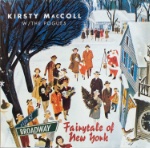 Released in 1987 after a couple years of development, the song first appeared on the Pogues' If I Should Fall From Grace With God album. The band's bassist and singer Cait O'Riordan had originally been tapped to provide the female duet vocal, but she left the band to marry Elvis Costello before the track was completed, so producer Steve Lillywhite took the track home to his wife, Kirsty MacColl, whose vocal is arguably the hook that sells this tune, although one should not overlook the overall quality of the songwriting here. The song hit number 2 on the Christmastime UK charts in its first go-round and has returned to the UK charts in nearly two dozen holiday seasons since then. The song has also been widely compiled on Christmas anthologies and has spawned numerous covers over its life.
Released in 1987 after a couple years of development, the song first appeared on the Pogues' If I Should Fall From Grace With God album. The band's bassist and singer Cait O'Riordan had originally been tapped to provide the female duet vocal, but she left the band to marry Elvis Costello before the track was completed, so producer Steve Lillywhite took the track home to his wife, Kirsty MacColl, whose vocal is arguably the hook that sells this tune, although one should not overlook the overall quality of the songwriting here. The song hit number 2 on the Christmastime UK charts in its first go-round and has returned to the UK charts in nearly two dozen holiday seasons since then. The song has also been widely compiled on Christmas anthologies and has spawned numerous covers over its life.
Recently in 1980s Category
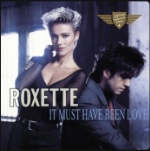 The Swedish duo's song, a solid 80s-90s pop rock midtempo ballad with Christmas overtones, was originally released in 1987, only in Sweden. That version was subtitled "Christmas For the Broken Hearted." That version eventually found its way into their worldwide catalog on a 1997 re-release of the album Pearls of Passion. Subsequent re-recordings, including an inclusion on the soundtrack of the film "Pretty Woman," toned down the Christmas references, and there's even a Spanish language version. (The link to the most Christmas-oriented version on Amazon is to a wildly expensive import CD, but you can download or stream it for much, much less. Or you can settle for the "Pretty Woman" version.)
The Swedish duo's song, a solid 80s-90s pop rock midtempo ballad with Christmas overtones, was originally released in 1987, only in Sweden. That version was subtitled "Christmas For the Broken Hearted." That version eventually found its way into their worldwide catalog on a 1997 re-release of the album Pearls of Passion. Subsequent re-recordings, including an inclusion on the soundtrack of the film "Pretty Woman," toned down the Christmas references, and there's even a Spanish language version. (The link to the most Christmas-oriented version on Amazon is to a wildly expensive import CD, but you can download or stream it for much, much less. Or you can settle for the "Pretty Woman" version.)
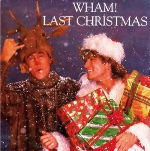 This was a rare instance of an artist submarining his own record's chance to top the charts. The bouncy 1984 synth-pop rocker was held to number 2 on the UK charts by "Do They Know It's Christmastime," the superstar-driven hit charity recording on which George Michael also made a lead vocal appearance. Trivia: Until 2021, "Last Christmas" was the biggest-selling UK single to never make number 1. That year broke the string. The song also contends with "Fairytale of New York" on the UK's most-played Christmas songs list. Michael played all instruments heard on the track, using synthesizers and the then-new Linn drum machine, although Wikipedia intimates the sleigh bells were the real thing. It's a simple lost-love tune with hooks galore, and that explains its worldwide popularity not only in the original version, but in the wide variety of covers it has received. (There used to be a blog that compiled nothing but "Last Christmas" covers.)
This was a rare instance of an artist submarining his own record's chance to top the charts. The bouncy 1984 synth-pop rocker was held to number 2 on the UK charts by "Do They Know It's Christmastime," the superstar-driven hit charity recording on which George Michael also made a lead vocal appearance. Trivia: Until 2021, "Last Christmas" was the biggest-selling UK single to never make number 1. That year broke the string. The song also contends with "Fairytale of New York" on the UK's most-played Christmas songs list. Michael played all instruments heard on the track, using synthesizers and the then-new Linn drum machine, although Wikipedia intimates the sleigh bells were the real thing. It's a simple lost-love tune with hooks galore, and that explains its worldwide popularity not only in the original version, but in the wide variety of covers it has received. (There used to be a blog that compiled nothing but "Last Christmas" covers.)
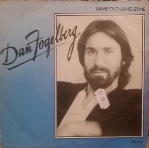 The popular Seventies singer-songwriter is probably best known for this 1980 single, which he notes was based on a true story of encountering a former lover in a store on Christmas Eve. It's a nice piece of melancholy that not only quotes "Auld Lang Syne" but also the 1812 Overture. The downtempo ballad is occasionally covered as a medley with the classic New Year's theme. Dan subsequently released a Christmas album in 1999, First Christmas Morning, but it didn't include his holiday hit.
The popular Seventies singer-songwriter is probably best known for this 1980 single, which he notes was based on a true story of encountering a former lover in a store on Christmas Eve. It's a nice piece of melancholy that not only quotes "Auld Lang Syne" but also the 1812 Overture. The downtempo ballad is occasionally covered as a medley with the classic New Year's theme. Dan subsequently released a Christmas album in 1999, First Christmas Morning, but it didn't include his holiday hit.
 Nowadays, major record labels are known for two things: endlessly reissuing top artists' legacy recordings and taking the lion's share of contemporary artists' streaming royalties. Once upon a time, some of the top labels actually attempted to appeal directly to record buyers in hopes of creating loyalty to the brand. (Remember the back of an early Who album in which the record company highlighted its other releases, noting, "If you liked The Who you are sure to love Len Barry"?) Warner Brothers took this to legendary heights starting in the late Sixties with its fourth-wall-breaking magazine ads for such things as Van Dyke Parks' debut album Song Cycle, which did so poorly at retail the company not only mentioned the poor sales in the ads, it told listeners to send their worn-out copies back to the company and they would receive two mint copies by return post, one to be given to a friend. Over time Warners would offer limited release label compilations, two vinyl LPs at a time, for a dime via mail. Around 1988 Warners dropped the compilation named above, serial numbered as a promotional release, though Discogs notes that it was offered in colored vinyl (one red disc, one green), cassette, and CD versions. Half the 37 individual cuts were radio station bumpers recorded by artists signed to Warners, some of whom also contributed full Christmas songs to the collection. This was probably the first known release of Los Lobos' "Rudolph the Manic Reindeer," a Tex-Mex instrumental version of the popular carol that has since been compiled frequently on other collections. Other tunes include Jeff Lorber's jazz fusion "God Rest the House," Good Question's hip-hop flavored "Winter Wonderland," more of the same on "Cold Chillin' Christmas" by Cold Chillin' Juice Crew, the 80s synth-rock-pop "Maybe This Could Be the Christmas" by Gardner Cole, the jazzy vocal "Once in a Blue Moon Rising" by PM, more 80s pop by Secret Weapon on "I'm Coming Home," folky pop number "Fais Do Do" by Daniel Lanois, and Mark O'Connor's semi-pop-classical instrumental of "What Child Is This." Jim Horn's sax takes the lead on "Silver Bells," Thomas Page offers the ballad "Christmas Without You," Hugo Largo goes ambient on "Angels We Have Heard On High/Gloria," Danielle Dax does a nicely uptempo shuffle on "Blue Christmas," and Jessie Ed Davis' funky "Santa Claus Is Getting Down" is a collection highlight that I haven't encountered anywhere else but here. The band 54-40 offers "2000 Years of Love," Honeymoon Suite does a faithful rendering of "I Believe in Father Christmas," and items heard elsewhere include R.E.M.'s "Deck the Halls" and Throwing Muses' "Santa." Rounding out the musical offerings are Peter Cetera's "Silent Night" and Randy Travis' country lament "How Do I Wrap My Heart Up For Christmas." Pee Wee Herman fans will be happy to encounter three bumpers by him, including one in which he claims to be one of the Traveling Wilburys, complimenting the Wilburys bumper done by George Harrison. A fine legacy collection, and if you're willing to pay collector money you can get a copy from places like Discogs and eBay. (Warners did another one called Yulesville in 1987, but I've yet to track down a copy of that.)
Nowadays, major record labels are known for two things: endlessly reissuing top artists' legacy recordings and taking the lion's share of contemporary artists' streaming royalties. Once upon a time, some of the top labels actually attempted to appeal directly to record buyers in hopes of creating loyalty to the brand. (Remember the back of an early Who album in which the record company highlighted its other releases, noting, "If you liked The Who you are sure to love Len Barry"?) Warner Brothers took this to legendary heights starting in the late Sixties with its fourth-wall-breaking magazine ads for such things as Van Dyke Parks' debut album Song Cycle, which did so poorly at retail the company not only mentioned the poor sales in the ads, it told listeners to send their worn-out copies back to the company and they would receive two mint copies by return post, one to be given to a friend. Over time Warners would offer limited release label compilations, two vinyl LPs at a time, for a dime via mail. Around 1988 Warners dropped the compilation named above, serial numbered as a promotional release, though Discogs notes that it was offered in colored vinyl (one red disc, one green), cassette, and CD versions. Half the 37 individual cuts were radio station bumpers recorded by artists signed to Warners, some of whom also contributed full Christmas songs to the collection. This was probably the first known release of Los Lobos' "Rudolph the Manic Reindeer," a Tex-Mex instrumental version of the popular carol that has since been compiled frequently on other collections. Other tunes include Jeff Lorber's jazz fusion "God Rest the House," Good Question's hip-hop flavored "Winter Wonderland," more of the same on "Cold Chillin' Christmas" by Cold Chillin' Juice Crew, the 80s synth-rock-pop "Maybe This Could Be the Christmas" by Gardner Cole, the jazzy vocal "Once in a Blue Moon Rising" by PM, more 80s pop by Secret Weapon on "I'm Coming Home," folky pop number "Fais Do Do" by Daniel Lanois, and Mark O'Connor's semi-pop-classical instrumental of "What Child Is This." Jim Horn's sax takes the lead on "Silver Bells," Thomas Page offers the ballad "Christmas Without You," Hugo Largo goes ambient on "Angels We Have Heard On High/Gloria," Danielle Dax does a nicely uptempo shuffle on "Blue Christmas," and Jessie Ed Davis' funky "Santa Claus Is Getting Down" is a collection highlight that I haven't encountered anywhere else but here. The band 54-40 offers "2000 Years of Love," Honeymoon Suite does a faithful rendering of "I Believe in Father Christmas," and items heard elsewhere include R.E.M.'s "Deck the Halls" and Throwing Muses' "Santa." Rounding out the musical offerings are Peter Cetera's "Silent Night" and Randy Travis' country lament "How Do I Wrap My Heart Up For Christmas." Pee Wee Herman fans will be happy to encounter three bumpers by him, including one in which he claims to be one of the Traveling Wilburys, complimenting the Wilburys bumper done by George Harrison. A fine legacy collection, and if you're willing to pay collector money you can get a copy from places like Discogs and eBay. (Warners did another one called Yulesville in 1987, but I've yet to track down a copy of that.)

Actually, I only ever found this on a flexidisc from Britain's Flexipop magazine back in 1981. Taking the track from "Rapture," Debbie Harry and Fab Five Freddy do a little Christmas rapping, no Kurtis Blow reference intended. A fun item if a rare one; I think this has managed to go unissued from that day to this one. UPDATE: You can download this from Amazon or stream it pretty readily as of 2021, provided your search misspells it as "Yuletide Throwdown."
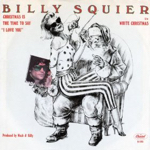
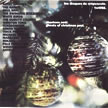 This compilation originally hit the streets in the vinyl era, 1981 to be precise, and has been reissued a couple of times with different lineups of songs. It was originally put together by Les Disques du Crepuscule, a Belgian independent label whose name, near as I can tell, means "records in the dark." The label's roster featured post-punk and "new wave" artists like Paul Haig, Wim Mertens and Tuxedomoon, who are represented here along with artists from such labels as Factory and Postcard. This 2007 reissue gathers up all the different songs that have been part of the album over the years, along with the various bits of cover art in which they were housed. Some more unkind folks might consider this a representative sample of early to mid-80s mope rock, but I say this stuff is well thought out even at its most obscure. The Swinging Buildings do their best Depeche Mode on "Praying For a Cheaper Christmas," Paul Haig's "Christiana" is a relationship song involving an appropriately named woman, while his "Scottish Christmas" is a more upbeat instrumental, and Aztec Camera goes all Django Reinhart on "Hot Club of Christmas," a swingy acoustic guitar medley of carols. Durutti Column contributes a pair of ethereal instrumentals, "One Christmas For Your Thoughts" and "Snowflakes." The French Impressionists try their hand at an American funk arrangement of "Santa Baby," and Hillcrest Club take an XTC approach to the instrumental "Breakfast at Christmas." Hawaiian Christmases are considered twice here, with Magazzini Criminali's "Honolulu 25 Dicembre 1990," though I'm at a loss to make the connection through the quasi-free jazz and Italian whispering, and Antena's "Noelle a Hawaii," which gets a bit of spaghetti Western guitar going against ocean sounds before shifting into synth-pop. This is a fairly eclectic grouping with not a lot of obvious holiday connections, possibly off-putting to some and right up others' alleys. Gotta say this stuff holds up pretty well for being a quarter-century old, too. Do I need to add this reissue is out of print yet again? Check Amazon for 3rd parties with copies of this import.
This compilation originally hit the streets in the vinyl era, 1981 to be precise, and has been reissued a couple of times with different lineups of songs. It was originally put together by Les Disques du Crepuscule, a Belgian independent label whose name, near as I can tell, means "records in the dark." The label's roster featured post-punk and "new wave" artists like Paul Haig, Wim Mertens and Tuxedomoon, who are represented here along with artists from such labels as Factory and Postcard. This 2007 reissue gathers up all the different songs that have been part of the album over the years, along with the various bits of cover art in which they were housed. Some more unkind folks might consider this a representative sample of early to mid-80s mope rock, but I say this stuff is well thought out even at its most obscure. The Swinging Buildings do their best Depeche Mode on "Praying For a Cheaper Christmas," Paul Haig's "Christiana" is a relationship song involving an appropriately named woman, while his "Scottish Christmas" is a more upbeat instrumental, and Aztec Camera goes all Django Reinhart on "Hot Club of Christmas," a swingy acoustic guitar medley of carols. Durutti Column contributes a pair of ethereal instrumentals, "One Christmas For Your Thoughts" and "Snowflakes." The French Impressionists try their hand at an American funk arrangement of "Santa Baby," and Hillcrest Club take an XTC approach to the instrumental "Breakfast at Christmas." Hawaiian Christmases are considered twice here, with Magazzini Criminali's "Honolulu 25 Dicembre 1990," though I'm at a loss to make the connection through the quasi-free jazz and Italian whispering, and Antena's "Noelle a Hawaii," which gets a bit of spaghetti Western guitar going against ocean sounds before shifting into synth-pop. This is a fairly eclectic grouping with not a lot of obvious holiday connections, possibly off-putting to some and right up others' alleys. Gotta say this stuff holds up pretty well for being a quarter-century old, too. Do I need to add this reissue is out of print yet again? Check Amazon for 3rd parties with copies of this import.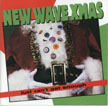 At one time, Rhino was almost the official rock 'n roll Christmas record label, but it's been quite a while since they've compiled any holiday music. From their Just Can't Get Enough series of 80s new wave music, this 1997 collection isn't complete but does bring a fairly disparate group of artists together on one convenient CD from the 70s to the 90s. Three of the cuts are from IRS Records' Just in Time for Christmas album, but the rest are from all over the map. XTC's "Thanks For Christmas" makes another appearance here, credited to the pseudonymous Three Wise Men. Other artists span the decade from Los Lobos to Root Boy Slim and the Sex Change Band, from They Might Be Giants and their offshoot Mono Puff to The Pretenders, from Matthew Sweet to Sun 60. Two interesting duets are on here, The Pogues with Kirsty MacColl doing "Fairytale of New York" and Bing Crosby with David Bowie doing "Peace On Earth/Little Drummer Boy," from Bing's last Christmas special in 1977. Not quite a definitive collection, but worthwhile for its mix of better-known stuff with rarities and for its liner notes. This CD is out of print and commanding collector's prices on Amazon via 3rd parties.
At one time, Rhino was almost the official rock 'n roll Christmas record label, but it's been quite a while since they've compiled any holiday music. From their Just Can't Get Enough series of 80s new wave music, this 1997 collection isn't complete but does bring a fairly disparate group of artists together on one convenient CD from the 70s to the 90s. Three of the cuts are from IRS Records' Just in Time for Christmas album, but the rest are from all over the map. XTC's "Thanks For Christmas" makes another appearance here, credited to the pseudonymous Three Wise Men. Other artists span the decade from Los Lobos to Root Boy Slim and the Sex Change Band, from They Might Be Giants and their offshoot Mono Puff to The Pretenders, from Matthew Sweet to Sun 60. Two interesting duets are on here, The Pogues with Kirsty MacColl doing "Fairytale of New York" and Bing Crosby with David Bowie doing "Peace On Earth/Little Drummer Boy," from Bing's last Christmas special in 1977. Not quite a definitive collection, but worthwhile for its mix of better-known stuff with rarities and for its liner notes. This CD is out of print and commanding collector's prices on Amazon via 3rd parties.
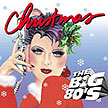 This field has been plowed before -- in fact, it's been plowed by Rhino as part of the "Just Can't Get Enough" series. VH1 being what it is though, what we have is a far more mainstream 80s Christmas compilation. Nearly every song on this 2001 collection is mentioned elsewhere on the site, and many have been on numerous compilations. That said, it does have the not-easily-found-otherwise Los Lobos song "Rudolph the Manic Reindeer." And they exhibit a little taste by giving us the Bob and Doug MacKenzie "12 Days of Christmas." Otherwise, no surprises, but if you don't have the majority of these tunes already you're going to want this. The Ramones, Pretenders, George Thorogood, The Alarm, Queen, Pat Benatar, Hall and Oates and Billy Squier are on the set list, and here's one more chance to get the Bing and Bowie tune. Out of print, but 3rd parties have copies at Amazon.
This field has been plowed before -- in fact, it's been plowed by Rhino as part of the "Just Can't Get Enough" series. VH1 being what it is though, what we have is a far more mainstream 80s Christmas compilation. Nearly every song on this 2001 collection is mentioned elsewhere on the site, and many have been on numerous compilations. That said, it does have the not-easily-found-otherwise Los Lobos song "Rudolph the Manic Reindeer." And they exhibit a little taste by giving us the Bob and Doug MacKenzie "12 Days of Christmas." Otherwise, no surprises, but if you don't have the majority of these tunes already you're going to want this. The Ramones, Pretenders, George Thorogood, The Alarm, Queen, Pat Benatar, Hall and Oates and Billy Squier are on the set list, and here's one more chance to get the Bing and Bowie tune. Out of print, but 3rd parties have copies at Amazon.
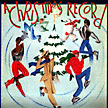 A very New York bohemian compilation from 1981. Ze specialized in post-disco dance music and post-apocalyptic world views, a style known at the time as "no wave," though not all the label's artists fit this classification. Some of the cuts on here are Christmas carols you can slash your wrists by, especially Cristina's "Things Fall Apart." Also represented are August Darnell of Kid Creole and the Coconuts with "Christmas on Riverside Drive," the band Suicide with "Hey Lord" and Suicide member Alan Vega with "No More Christmas Blues," Was (Not Was) with "Christmas Time In the Motor City" (they also backed Cristina), Material with Nona Hendryx doing "It's a Holiday" and the first appearance of The Waitresses' "Christmas Wrapping," a holiday staple for the young and single. Terrific cover artwork belies the downtempo content. By the way, in case you're confused, I like this album. Passport reissued it on CD at some point, fattening it up with a cut by The Three Courgettes and James White and the Blacks' "Christmas With Satan," which makes the rest of the album sound like a Bing Crosby Christmas special. There's a French import from 2004, ZE Christmas Record Reloaded, with additional songs. In 2008 Ze was reactivated and this album re-released with 14 tracks, the highest number yet, although it appears all the original eight songs remain available. Hardcopies on vinyl and CD get serious collector prices, but both versions mentioned here are downloadable from Amazon.
A very New York bohemian compilation from 1981. Ze specialized in post-disco dance music and post-apocalyptic world views, a style known at the time as "no wave," though not all the label's artists fit this classification. Some of the cuts on here are Christmas carols you can slash your wrists by, especially Cristina's "Things Fall Apart." Also represented are August Darnell of Kid Creole and the Coconuts with "Christmas on Riverside Drive," the band Suicide with "Hey Lord" and Suicide member Alan Vega with "No More Christmas Blues," Was (Not Was) with "Christmas Time In the Motor City" (they also backed Cristina), Material with Nona Hendryx doing "It's a Holiday" and the first appearance of The Waitresses' "Christmas Wrapping," a holiday staple for the young and single. Terrific cover artwork belies the downtempo content. By the way, in case you're confused, I like this album. Passport reissued it on CD at some point, fattening it up with a cut by The Three Courgettes and James White and the Blacks' "Christmas With Satan," which makes the rest of the album sound like a Bing Crosby Christmas special. There's a French import from 2004, ZE Christmas Record Reloaded, with additional songs. In 2008 Ze was reactivated and this album re-released with 14 tracks, the highest number yet, although it appears all the original eight songs remain available. Hardcopies on vinyl and CD get serious collector prices, but both versions mentioned here are downloadable from Amazon.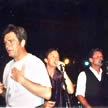 The popular 80s band had this out originally on a limited basis in 1984 and it was on their website for a free download in 2008. It's a straight a capella performance of "Winter Wonderland," not quite doo-wop but definitely not glee club either. Worth having.
The popular 80s band had this out originally on a limited basis in 1984 and it was on their website for a free download in 2008. It's a straight a capella performance of "Winter Wonderland," not quite doo-wop but definitely not glee club either. Worth having. This was the flip side of the song "I Would Die 4 U," from the "Purple Rain" soundtrack, and if you didn't know it was Prince, you still would be hard pressed to guess anybody else. It's one of The Artist's power ballad/melodramas, and while it's not as good as its A-side, it's still a worthy effort for the Christmas season. Given Prince's prolific tendencies, it's kind of amazing he hasn't done another Christmas song since this 1984 effort. Still available on Prince's B-sides compilation CD.
This was the flip side of the song "I Would Die 4 U," from the "Purple Rain" soundtrack, and if you didn't know it was Prince, you still would be hard pressed to guess anybody else. It's one of The Artist's power ballad/melodramas, and while it's not as good as its A-side, it's still a worthy effort for the Christmas season. Given Prince's prolific tendencies, it's kind of amazing he hasn't done another Christmas song since this 1984 effort. Still available on Prince's B-sides compilation CD.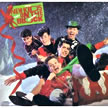 Yeah, yeah, I know, one of the original "boy bands," though they had the good fortune to fall into the hands of New Edition producer Maurice Starr, who produced and wrote or co-wrote all the original songs on this 1989 album. (Ironically, he wasn't around for New Edition's Christmas album.) As a result, this has the sound of an 80s R'nB record, which means good grooves and cheap synthesizers. The album is bracketed with the sappy and non-holiday "This One's For the Children," but the second cut, "Last Night I Saw Santa Claus," gets things into a more uptempo groove, as does the rap "Funky Funky Xmas." The rest of the tunes are pretty downtempo, from straight ballads to slow jams. Covers of "White Christmas" and "Little Drummer Boy" round things out. Given the strong musical bed, it's sometimes disappointing when the Kids' white-bread voices come in. Still, this album isn't nearly as embarrassing as it could be. No doubt this was reissued for 2008 in the wake of the NKOTB reunion.
Yeah, yeah, I know, one of the original "boy bands," though they had the good fortune to fall into the hands of New Edition producer Maurice Starr, who produced and wrote or co-wrote all the original songs on this 1989 album. (Ironically, he wasn't around for New Edition's Christmas album.) As a result, this has the sound of an 80s R'nB record, which means good grooves and cheap synthesizers. The album is bracketed with the sappy and non-holiday "This One's For the Children," but the second cut, "Last Night I Saw Santa Claus," gets things into a more uptempo groove, as does the rap "Funky Funky Xmas." The rest of the tunes are pretty downtempo, from straight ballads to slow jams. Covers of "White Christmas" and "Little Drummer Boy" round things out. Given the strong musical bed, it's sometimes disappointing when the Kids' white-bread voices come in. Still, this album isn't nearly as embarrassing as it could be. No doubt this was reissued for 2008 in the wake of the NKOTB reunion.
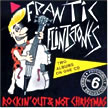 And yeah, that's almost right, except this self-proclaimed psychobilly band did do three Christmas tunes on this 1988 album, reissued as a double with the album Rockin' Out. They do good versions of "Santa Bring My Baby Back to Me," "Santa Claus Is Back In Town" and they set a martial beat to "Blue Christmas." Oh, almost overlooked "Oh Little Town of Bedrock," in which the 'Stoneses home town is substituted for Bethlehem, and most of the song is substituted for a really fast shuffle that doesn't sound like any Christmas song I know. Sure rocks out, though.
And yeah, that's almost right, except this self-proclaimed psychobilly band did do three Christmas tunes on this 1988 album, reissued as a double with the album Rockin' Out. They do good versions of "Santa Bring My Baby Back to Me," "Santa Claus Is Back In Town" and they set a martial beat to "Blue Christmas." Oh, almost overlooked "Oh Little Town of Bedrock," in which the 'Stoneses home town is substituted for Bethlehem, and most of the song is substituted for a really fast shuffle that doesn't sound like any Christmas song I know. Sure rocks out, though.
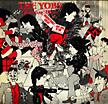 This 1980 British-only album trumps the previously-mentioned Ravers by offering an entire album of punk rock Christmas tunes, probably the first such recording, created by The Yobs, better known by their name spelled backwards. It's mostly revved-up versions of Christmas standards, although there are a couple of originals here too, like "Another Christmas," as in "I don't think I could take / Another Christmas Day with yewwwwww." A little tedious all at once, but it has its moments. They also did "Yobs On 45," a single with a Christmas medley, in the fashion of those disco-era "Stars On 45" records, which was on the CD reissue. UPDATE: Randy Anthony's Hip Christmas has been following the Yobs/Boys more closely than I have, noting that they revisited punk Xmas with Christmas Vol. 2 in 1991, with all new songs, and a live album with acoustic versions of some of these songs. Not wanting to pilfer someone else's hard work -- those latter two albums are exceedingly rare -- you are advised to click on over for the rest of the story.
This 1980 British-only album trumps the previously-mentioned Ravers by offering an entire album of punk rock Christmas tunes, probably the first such recording, created by The Yobs, better known by their name spelled backwards. It's mostly revved-up versions of Christmas standards, although there are a couple of originals here too, like "Another Christmas," as in "I don't think I could take / Another Christmas Day with yewwwwww." A little tedious all at once, but it has its moments. They also did "Yobs On 45," a single with a Christmas medley, in the fashion of those disco-era "Stars On 45" records, which was on the CD reissue. UPDATE: Randy Anthony's Hip Christmas has been following the Yobs/Boys more closely than I have, noting that they revisited punk Xmas with Christmas Vol. 2 in 1991, with all new songs, and a live album with acoustic versions of some of these songs. Not wanting to pilfer someone else's hard work -- those latter two albums are exceedingly rare -- you are advised to click on over for the rest of the story.
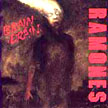 The Ramones were actually pretty slow to jump on the punk rock Christmas bandwagon; this is from 1989's Brain Drain album and also appeared on the occasional B-side and compilation since, like The Edge of Christmas and Rhino's Punk Rock Xmas, which notes its version is from the UK single. It's fairly self-explanatory; look at the beauty of the season, why can't we stop fighting, and so on. Writer (the late, great) Joey Ramone dedicates it to his girlfriend. An early demo of this turned up on Joey's solo EP.
The Ramones were actually pretty slow to jump on the punk rock Christmas bandwagon; this is from 1989's Brain Drain album and also appeared on the occasional B-side and compilation since, like The Edge of Christmas and Rhino's Punk Rock Xmas, which notes its version is from the UK single. It's fairly self-explanatory; look at the beauty of the season, why can't we stop fighting, and so on. Writer (the late, great) Joey Ramone dedicates it to his girlfriend. An early demo of this turned up on Joey's solo EP.
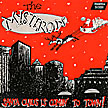 Another pseudonymous Christmas record, this is really the Revillos, who started life as the Rezillos, and if you know who I'm talking about you know what this 1981 record sounds like: a punk-pop girl-singer version of the Phil Spector arrangement of this song. To help you remember what year this record was made, the B-side is "1982 Make a Wish."
Another pseudonymous Christmas record, this is really the Revillos, who started life as the Rezillos, and if you know who I'm talking about you know what this 1981 record sounds like: a punk-pop girl-singer version of the Phil Spector arrangement of this song. To help you remember what year this record was made, the B-side is "1982 Make a Wish."
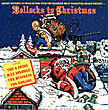 This British EP from 1981 features four songs by four different bands, two of which are pop Christmas covers and the other two holiday chestnuts. The 4 Skins hype up Elton John's "Step Into Christmas" and the Business do a straight cover of Slade's "Merry Christmas Everybody." If Irving Berlin thought Elvis ruined "White Christmas," The Gonads' version probably helped finish him off for good, and Max Splodge does a nearly incomprehensible "12 Days of Christmas" in which the lyrics are changed to... something else entirely, near as I can tell. UPDATE: Somewhere along the line, this vinyl EP became a full-length album. Amazon posts it as 2007 but I recall hearing about the expansion earlier. WFMU-FM radio listed this expanded compilation as having a release date of 1994. Add to the above songs "Christmas Time Again" by Bad Manners, "I Wish It Could Be Christmas Every Day," "Christmas Medley," "Christmas Is Really Fantastic" and "O Come All Ye Faithful" by Frank Sidebottom, "Snowman" by Anti-Nowhere League, "Blue Christmas" and "Santa Bring My Baby Back To Me" by Frantic Flintstones, "Jingle Bells" and "Christmas in Dreadland" by Judge Dread, "Stuff the Turkey" by Alien Sex Fiend, "Turkey Stomp" by The Hotknives, "Auld Lang Syne" by UK Subs, "Drinking and Driving" by Business and "White Christmas" by Stiff Little Fingers. Some of these songs have been mentioned elsewhere on the site, others have not. They appear to be a wider sampling of Christmas punk from the same period as the original EP, however.
This British EP from 1981 features four songs by four different bands, two of which are pop Christmas covers and the other two holiday chestnuts. The 4 Skins hype up Elton John's "Step Into Christmas" and the Business do a straight cover of Slade's "Merry Christmas Everybody." If Irving Berlin thought Elvis ruined "White Christmas," The Gonads' version probably helped finish him off for good, and Max Splodge does a nearly incomprehensible "12 Days of Christmas" in which the lyrics are changed to... something else entirely, near as I can tell. UPDATE: Somewhere along the line, this vinyl EP became a full-length album. Amazon posts it as 2007 but I recall hearing about the expansion earlier. WFMU-FM radio listed this expanded compilation as having a release date of 1994. Add to the above songs "Christmas Time Again" by Bad Manners, "I Wish It Could Be Christmas Every Day," "Christmas Medley," "Christmas Is Really Fantastic" and "O Come All Ye Faithful" by Frank Sidebottom, "Snowman" by Anti-Nowhere League, "Blue Christmas" and "Santa Bring My Baby Back To Me" by Frantic Flintstones, "Jingle Bells" and "Christmas in Dreadland" by Judge Dread, "Stuff the Turkey" by Alien Sex Fiend, "Turkey Stomp" by The Hotknives, "Auld Lang Syne" by UK Subs, "Drinking and Driving" by Business and "White Christmas" by Stiff Little Fingers. Some of these songs have been mentioned elsewhere on the site, others have not. They appear to be a wider sampling of Christmas punk from the same period as the original EP, however.
 Still another Christmas punk single from 1983 by a Welsh band, with a nod to "punks and skins (skinheads) everywhere," keeping in mind that Brit skinheads of the 80s were not quite as sinister as American skinheads of the 90s. No surprises here, although it's a fairly listenable Christmas rocker.
Still another Christmas punk single from 1983 by a Welsh band, with a nod to "punks and skins (skinheads) everywhere," keeping in mind that Brit skinheads of the 80s were not quite as sinister as American skinheads of the 90s. No surprises here, although it's a fairly listenable Christmas rocker.
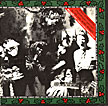 A politically oriented British punk band best known for Christ -- The Album and The Feeding of the Five Thousand, this 1981 single seems to have fallen through the cracks, probably because it is completely atypical; The Trouser Press Record Guide describes the band as abrasive and guitar-oriented with political lyrics, yet this double-sided instrumental single is organ, synths and drum machine playing a mixture of traditional holiday tunes and original themes in medley form. Both sides are this way, in fact, although they are not identical performances. A legend on the B-side label notes that 20 million turkeys are slaughtered for Christmas in Britain alone, for what that's worth.
A politically oriented British punk band best known for Christ -- The Album and The Feeding of the Five Thousand, this 1981 single seems to have fallen through the cracks, probably because it is completely atypical; The Trouser Press Record Guide describes the band as abrasive and guitar-oriented with political lyrics, yet this double-sided instrumental single is organ, synths and drum machine playing a mixture of traditional holiday tunes and original themes in medley form. Both sides are this way, in fact, although they are not identical performances. A legend on the B-side label notes that 20 million turkeys are slaughtered for Christmas in Britain alone, for what that's worth.
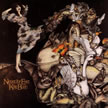 The highly elusive and dramatic singer-songwriter from England, a protege of Pink Floyd's David Gilmour, visited the Christmas music realm for the first time in 1980 with this theatrical ballad full of nostalgia and anticipation for the holiday. Not exactly a turntable hit, it nevertheless resonates fondly among her fans and pops up frequently on compilations, not to mention as a frequently compiled B-side among her later singles. You need to prowl compilations to find it though, as it only appears on her box set now.
The highly elusive and dramatic singer-songwriter from England, a protege of Pink Floyd's David Gilmour, visited the Christmas music realm for the first time in 1980 with this theatrical ballad full of nostalgia and anticipation for the holiday. Not exactly a turntable hit, it nevertheless resonates fondly among her fans and pops up frequently on compilations, not to mention as a frequently compiled B-side among her later singles. You need to prowl compilations to find it though, as it only appears on her box set now.
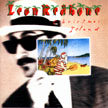 Long a cult artist since he turned up in the early 70s with a fair amount of hype in Rolling Stone magazine, most people only know of him today through his Budweiser commercials. Leon's thing has always been early jazz-age pop singing with period instrumentation, and this 1987 collection of pop Christmas chestnuts is solidly in that tradition. A little too sedate for a rock 'n roll Christmas, perhaps, but his duet with Dr. John on "Frosty the Snowman" is a nice change of pace on your Christmas mix tapes.
Long a cult artist since he turned up in the early 70s with a fair amount of hype in Rolling Stone magazine, most people only know of him today through his Budweiser commercials. Leon's thing has always been early jazz-age pop singing with period instrumentation, and this 1987 collection of pop Christmas chestnuts is solidly in that tradition. A little too sedate for a rock 'n roll Christmas, perhaps, but his duet with Dr. John on "Frosty the Snowman" is a nice change of pace on your Christmas mix tapes.
 Shooting Star, despite being on alternative label Enigma, was more of a pop/hard rock act, with all the late-80s shiny production that suggests. But having said that, this isn't a bad Christmas rocker, although the production suggests something that's played over the closing credits of a movie. From their greatest-hits album, circa 1989, although it may have been recorded earlier than that.
Shooting Star, despite being on alternative label Enigma, was more of a pop/hard rock act, with all the late-80s shiny production that suggests. But having said that, this isn't a bad Christmas rocker, although the production suggests something that's played over the closing credits of a movie. From their greatest-hits album, circa 1989, although it may have been recorded earlier than that.
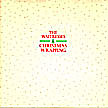 The title's a pun on late lead singer Patty Donohue's talk-sing delivery of a great song about being single on Christmas Eve. An instant classic in the vein of the Waitresses' best-known hit, "I Know What Boys Like." Originally released on the Ze Christmas album, also released as a single, and is on the group's best-of album as well as EMI's The Edge of Christmas and Excelsior's A Rock 'n Roll Christmas. Amazon has a downloadable EP that has the single edit, the regular version and an instrumental called "Hangover 1/1/83." King Biscuit Flower Hour also released a live Waitresses album from 1982 that includes a concert version of the song.
The title's a pun on late lead singer Patty Donohue's talk-sing delivery of a great song about being single on Christmas Eve. An instant classic in the vein of the Waitresses' best-known hit, "I Know What Boys Like." Originally released on the Ze Christmas album, also released as a single, and is on the group's best-of album as well as EMI's The Edge of Christmas and Excelsior's A Rock 'n Roll Christmas. Amazon has a downloadable EP that has the single edit, the regular version and an instrumental called "Hangover 1/1/83." King Biscuit Flower Hour also released a live Waitresses album from 1982 that includes a concert version of the song.
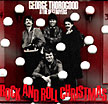 George is better known for leaving his band high and dry in the spring while he runs off and plays baseball, or for his one great video of "Bad to the Bone" with Bo Diddley. Still, he apparently has a soft enough spot for the holidays that he wrote both sides of this 1983 single, the B-side being "New Year's Eve Party." The A-side turns up on compilations from time to time, the B-side hardly ever. George put out another holiday single a couple of decades later, and we have that posted elsewhere on the site.
George is better known for leaving his band high and dry in the spring while he runs off and plays baseball, or for his one great video of "Bad to the Bone" with Bo Diddley. Still, he apparently has a soft enough spot for the holidays that he wrote both sides of this 1983 single, the B-side being "New Year's Eve Party." The A-side turns up on compilations from time to time, the B-side hardly ever. George put out another holiday single a couple of decades later, and we have that posted elsewhere on the site.
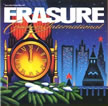 The synthesizer duo with the pop hooks and elaborate shows released this single in 1988, and it's aces, a danceable beat and terrific melody. This should be a holiday radio staple, but it's not. Originally available as a single and on a rare Warner Brothers compilation promo album, it was also on their Crackers International EP. The B-side of the single is "God Rest Ye Merry, Gentlemen," and that seems to be unavailable now.
The synthesizer duo with the pop hooks and elaborate shows released this single in 1988, and it's aces, a danceable beat and terrific melody. This should be a holiday radio staple, but it's not. Originally available as a single and on a rare Warner Brothers compilation promo album, it was also on their Crackers International EP. The B-side of the single is "God Rest Ye Merry, Gentlemen," and that seems to be unavailable now.
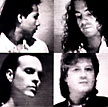 Available only as a promo CD at the time, the guys dashed off these two tunes at a 1989 soundcheck, "Christmas Time" and "Jinga Bell Rock," both originals. "Jinga" is a flat-out rocker with a touch of "Walk This Way" in it, and "Christmas Time" is more mid-tempo and reflective. Both are excellent performances but easily recognizable as BoDeans tunes. The band has since thoughtfully posted both songs at their own site for download.
Available only as a promo CD at the time, the guys dashed off these two tunes at a 1989 soundcheck, "Christmas Time" and "Jinga Bell Rock," both originals. "Jinga" is a flat-out rocker with a touch of "Walk This Way" in it, and "Christmas Time" is more mid-tempo and reflective. Both are excellent performances but easily recognizable as BoDeans tunes. The band has since thoughtfully posted both songs at their own site for download.
 Adams has a lot of fans, and just as many people who dismiss him as a watered-down Tom Petty. Needless to say, we won't dissuade the fans or change the minds of the nay-sayers with a single 45. "Christmas Time" is the A-side, and it's your basic Bryan Adams tune with a Christmas tilt from 1985. "Reggae Christmas" is a little bit more fun; you see the video for it on VH1 and MTV every year, with the five original MTV vee-jays and a crowd of others forming a conga line behind Bryan and his band. Let's see, they were J.J. Jackson, Nina Blackwood, Alan Hunter, Martha Quinn and .... drat, who was that dark-haired guy with the perm .... oh yeah, Mark Goodman. Adams did "Run Rudolph Run" for the first A Very Special Christmas, and he also appeared on a 2002 album called Christmas at the Vatican, singing the A-side here and "On Christmas Day." "Christmas Time" turns up on a number of compilations, but the B-side is pretty rare nowadays.
Adams has a lot of fans, and just as many people who dismiss him as a watered-down Tom Petty. Needless to say, we won't dissuade the fans or change the minds of the nay-sayers with a single 45. "Christmas Time" is the A-side, and it's your basic Bryan Adams tune with a Christmas tilt from 1985. "Reggae Christmas" is a little bit more fun; you see the video for it on VH1 and MTV every year, with the five original MTV vee-jays and a crowd of others forming a conga line behind Bryan and his band. Let's see, they were J.J. Jackson, Nina Blackwood, Alan Hunter, Martha Quinn and .... drat, who was that dark-haired guy with the perm .... oh yeah, Mark Goodman. Adams did "Run Rudolph Run" for the first A Very Special Christmas, and he also appeared on a 2002 album called Christmas at the Vatican, singing the A-side here and "On Christmas Day." "Christmas Time" turns up on a number of compilations, but the B-side is pretty rare nowadays.
